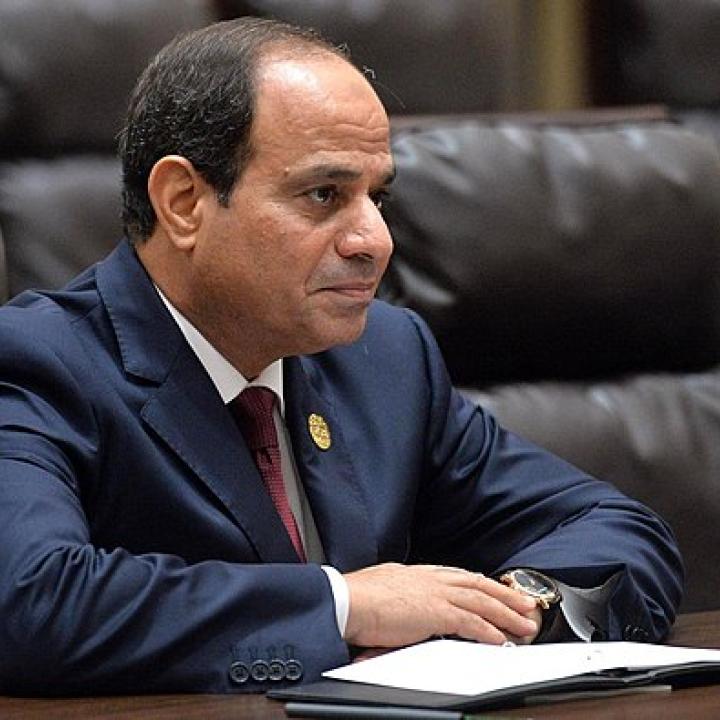
- Policy Analysis
- Fikra Forum
Egypt Has Not Revealed Any Workable Plan for Sudan

Despite numerous conferences and promises, Sudan's regional neighbors have done little to defuse the current conflict.
On July 13, leaders from the seven nations that border Sudan—Egypt, Libya, Chad, Central Africa, South Sudan, Ethiopia, and Eritrea—all attended a Cairo summit focused on resolving the current conflict between the Sudanese Armed Forces (SAF) and the Rapid Support Forces (RSF). Egyptian President Abdul Fattah al-Sisi spoke extensively about the conflict, saying the violence is affecting the security and stability of the entire region and even the entire globe. Sisi stressed the necessity for an extensive national conversation in Sudan encompassing all parties.
Yet Sisi and the other leaders at the summit completely failed to mention the UN press release published that same day which revealed that the RSF were responsible for killing at least 87 ethnic Masalit—including seven women and seven children—in West Darfu,r burying them in a mass grave. Though the revelation prompted UN High Commissioner for Human Rights Volker Türk to demand a thorough investigation and left many wondering why the International Criminal Court (ICC) had not yet become involved to prosecute the RSF and its supporters, Sisi and neighboring leaders remained silent about the issue.
Unfortunately, this silence on any RSF-related topics has become a pattern for Sisi over the course of the conflict.
Though Sisi and the leaders at the summit made a variety of sweeping statements—underscoring the importance of a political and peaceful resolution, demanding the expansion of the Intergovernmental Authority on Development (IGAD), and urging the international community to “act quickly” while declaring their willingness to participate in any war-ending efforts—they have consistently fallen short in recognizing the accusations of war crimes, genocide, and crimes against humanity committed by the RSF. If neighboring countries, especially Egypt, want to keep Sudan from descending into civil war and chaos, why will they not point the blame at those most responsible?
Beyond this silence on key aspects of the conflict, regional efforts to promote dialogue and a peaceful resolution in Sudan have been inconsistent and noncommittal. IGAD held its first “Quartet” meeting on the Sudan conflict on July 10, in which the Quartet recognized the efforts of the UN and regional and international allies and stressed IGAD's crucial role in coordinating diplomatic tracks with the African Union (AU). The Quartet also called the East African Standby Force (EASF) to discuss the possibility of deploying a backup force to protect civilians in Sudan and guarantee the delivery of humanitarian assistance—an effort IGAD said it would support along with the AU.
But the failed U.S.-Saudi Jeddah talks, the IGAD Quartet meeting, and now the Cairo summit have done little to actually bring the SAF and RSF closer towards negotiation and resolution. Case in point, Sudan’s Ministry of Foreign Affairs has unilaterally rejected the deployment of the EASF, meaning even humanitarian efforts are not viable. Moreover, the Cairo Summit actually made the declaration that, in order to avoid prolonging the conflict, it would not meddle in Sudan's domestic affairs. Instead, Summit attendees said they would treat the conflict as an “internal Sudanese affair.”
For Sisi, this inconsistency and idleness may be, in part, a product of his indecisiveness when it comes to choosing sides. Though Egypt has openly supported Abdel Fattah al-Burhan’s SAF in this conflict—likely in hopes of establishing a “Sisi model” in Sudan featuring a military regime in civilian attire—many of Egypt’s allies support the RSF. These indirect ties to the RSF may be prompting Sisi to hold back on any realistic support or solutions to the Sudan conflict, if not motivating him to turn a blind eye to the RSF's actions altogether.
Despite numerous action plans, summits, and promises made by regional stakeholders, little has been achieved in bringing both the SAF and RSF to the negotiating table for a lasting solution. Egypt, in particular, has failed to put into action its plans for helping Sudan get out of its crisis, producing no workable options to defuse the situation, begin genuine negotiations, safeguard supply convoys, preserve humanitarian corridors, or even open an inclusive dialogue. In order to resume Jeddah talks again, regional powers must obtain strict commitments from both the RSF and SAF to end the conflict, and regional powers, themselves, must commit to seeing their promises through.
